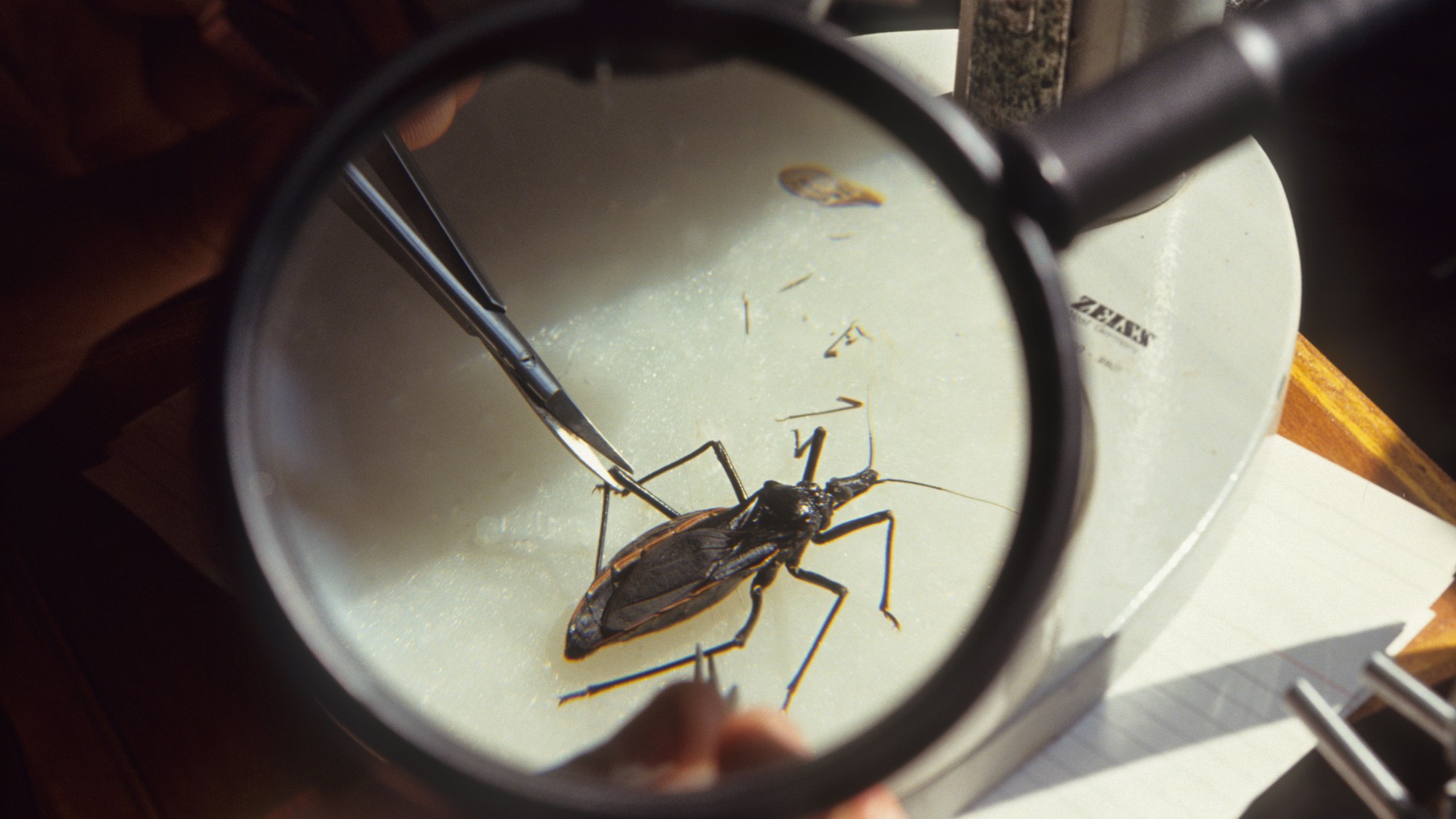By Devika Rao
Copyright theweek

SUBSCRIBE & SAVE
Less than $3 per week
View Profile
The Explainer
Talking Points
The Week Recommends
Newsletters
From the Magazine
The Week Junior
Food & Drink
Personal Finance
All Categories
Newsletter sign up
the explainer
Kissing bug disease has a growing presence in the US
The disease has had a steady stream of cases in the last 10 years
Newsletter sign up
Several kissing bug species are common in the southern U.S.
(Image credit: Universal Images Group / Getty Images)
Devika Rao, The Week US
25 September 2025
The parasitic kissing bug disease is not new, but it has become increasingly common to the point of becoming endemic in the U.S. Because of this, the insect-borne illness has become a point of interest for researchers. The disease can go unnoticed, but in severe cases, it can lead to lifelong chronic health issues.
What is kissing bug disease?
Also called Chagas disease, it is caused by the parasite Trypanosoma cruzi. This disease is spread by triatomine bugs, also called kissing bugs because they are “bloodsucking insects that tend to bite people’s faces,” said The New York Times.
The parasite is “mainly found in rural areas of Mexico and Central and South America,” said the Centers for Disease Control and Prevention. However, the disease has spread enough to officially be considered endemic to the U.S., according to a report published in the journal Emerging Infectious Diseases.
Escape your echo chamber. Get the facts behind the news, plus analysis from multiple perspectives.
SUBSCRIBE & SAVE
Sign up for The Week’s Free Newsletters
From our morning news briefing to a weekly Good News Newsletter, get the best of The Week delivered directly to your inbox.
From our morning news briefing to a weekly Good News Newsletter, get the best of The Week delivered directly to your inbox.
The triatomine bugs can infect people and other animals, including dogs. The disease goes largely unnoticed, as “most people in the United States only get diagnosed if they go to donate blood,” said the Times. “Only about 1% of people” infected with Chagas disease in the U.S. have been diagnosed. Many carry the disease without any symptoms, but it may also manifest as an acute or long-lasting infection.
The acute phase usually occurs within weeks or months of the parasite being contracted and can cause swelling at the infection site, as well as fever, fatigue, body rash, eyelid swelling and body aches. It could also cause gastrointestinal problems and swollen glands.
While acute infection is usually temporary, a chronic phase can appear 10 to 20 years after infection in about 20% to 30% of cases. This can lead to perpetual heart issues, such as an “enlarged heart, heart failure, altered heart rate or rhythm, or sudden death,” as well as digestive problems, like an “enlarged esophagus or colon, leading to trouble eating or going to the bathroom,” said the Mayo Clinic.
How common is it?
Approximately 8 million people globally, including an estimated 280,000 in the U.S., have kissing bug disease, and most are not aware of it, according to the CDC. Cases of the disease in humans have been found in Arizona, Texas, Louisiana, Missouri, Mississippi, Arkansas, Tennessee and California, while cases of Chagas disease in animals have also been found in New Mexico, Oklahoma, Nebraska, Alabama, Georgia, Florida, South Carolina, North Carolina, Kentucky, Virginia and Maryland.
Sign up for Today’s Best Articles in your inbox
A free daily email with the biggest news stories of the day – and the best features from TheWeek.com
Contact me with news and offers from other Future brandsReceive email from us on behalf of our trusted partners or sponsorsBy submitting your information you agree to the Terms & Conditions and Privacy Policy and are aged 16 or over.
“Several triatomine species are common in the southern United States, where they transmit T. cruzi and invade human dwellings,” said the Emerging Infectious Diseases report. The disease is already considered endemic in 21 countries in the Americas.
However, if you ask physicians about Chagas, they would think it’s either ”transmitted by ticks” or ”doesn’t exist in the U.S.,” said Bernardo Moreno Peniche, one of the authors of the review, to The Guardian.
Experts recommend sealing windows to prevent insects from entering, as well as clearing wood piles from near the property, where they can congregate. And be careful when eating raw fruits and vegetables, which could potentially contain feces from the insects.
The good news is that the chances of contracting the disease in the U.S. are still rare. Most Americans should “not be worried at all,” Caryn Bern, an epidemiologist at the University of California, San Francisco, said to the Times.
Devika Rao, The Week US
Social Links Navigation
Devika Rao has worked as a staff writer at The Week since 2022, covering science, the environment, climate and business. She previously worked as a policy associate for a nonprofit organization advocating for environmental action from a business perspective.
Trump’s plan for a government shutdown: mass firings
IN THE SPOTLIGHT
As lawmakers scramble to avoid a shutdown, the White House is making plans for widespread layoffs that could lead to a permanent federal downsizing
Inside Syria’s al-Hol camp
Under the radar
Aid cuts mean authorities face ‘uphill struggle’ to maintain security
The soups, noodles and cake to make this the most tasty fall yet
The Week Recommends
Soothing plates from across the globe
You might also like
Climate change is making us eat more sugar
Under the radar
Sweets make the heat feel more manageable
Private equity firms might be causing more deaths in hospital ERs
The Explainer
Deaths in ERs purchased by private equity firms rose 13%
Trump makes unmoored claims on Tylenol and autism
No causal relationship has been established between autism and acetaminophen use during pregnancy
RFK Jr. vaccine panel advises restricting MMRV shot
The committee voted to restrict access to a childhood vaccine against chickenpox
Quit-smoking ads are being put out
Under the radar
The dissolution of a government-funded campaign could lead to more smokers in the future
Sloth fever shows no signs of slowing down
The explainer
The vector-borne illness is expanding its range
A new subtype of diabetes was found and it may require different treatment
Under the radar
It is prevalent in Black Africans and Americans
Texas declares end to measles outbreak
The vaccine-preventable disease is still spreading in neighboring states, Mexico and Canada
View More ▸
Contact Future’s experts
Terms and Conditions
Privacy Policy
Cookie Policy
Advertise With Us
The Week is part of Future US Inc, an international media group and leading digital publisher. Visit our corporate site.
Future US, Inc. Full 7th Floor, 130 West 42nd Street



